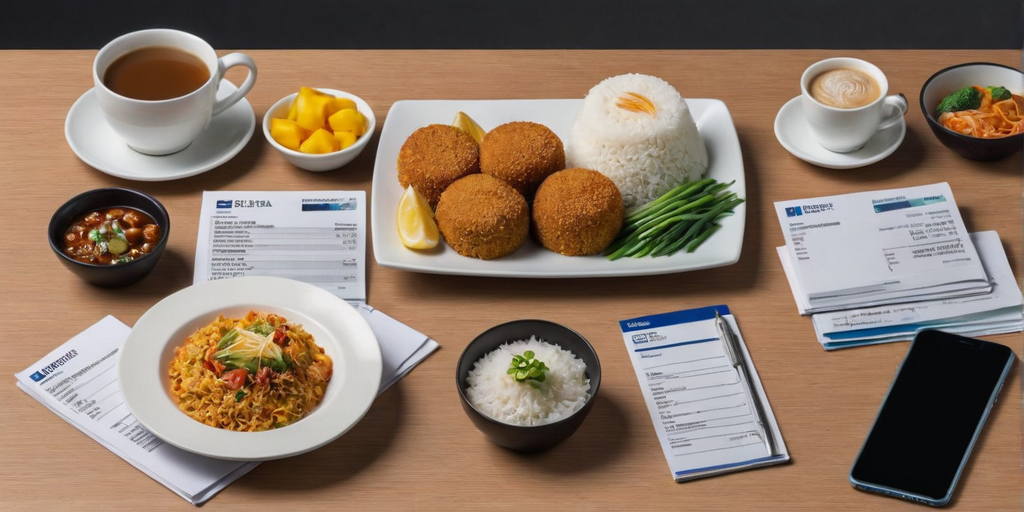Living in Singapore can be an exciting and rewarding experience. The city-state is known for its vibrant culture, modern infrastructure, and bustling economy. However, the cost of living in Singapore can be quite high, and it is important to evaluate whether your salary is enough to sustain your lifestyle.

Understanding Singapore’s cost of living is essential when evaluating whether your salary is enough. Singapore is consistently ranked as one of the most expensive cities in the world, and housing, transportation, and food are major expenses. Evaluating salary standards in Singapore can be tricky, as salaries can vary widely depending on factors such as industry, experience, and education. However, it is important to have a good understanding of the average salary range in your field to ensure that you are being fairly compensated.
Key Takeaways
- Understanding Singapore’s cost of living is essential when evaluating whether your salary is enough.
- Evaluating salary standards in Singapore can be tricky, but it is important to have a good understanding of the average salary range in your field.
- Housing, transportation, and food are major expenses in Singapore, and it is important to factor these into your budget when evaluating whether your salary is enough.
Understanding Singapore’s Cost of Living

Living in Singapore can be an exciting experience, but it is important to understand the cost of living before you move there. Singapore is known for its high cost of living, which is mainly due to its limited land and resources. The cost of living in Singapore is influenced by various factors such as housing, food, transportation, and healthcare.
One of the key indicators of the cost of living in Singapore is the core inflation rate. The core inflation rate is a measure of the change in prices of goods and services, excluding the costs of accommodation and private road transport. As of September 2023, the core inflation rate in Singapore was 1.3% year-on-year. This means that the prices of goods and services in Singapore have increased by 1.3% compared to the same period last year.
However, it is important to note that the headline inflation rate, which includes the costs of accommodation and private road transport, is usually higher than the core inflation rate. The headline inflation rate in Singapore was 2.6% year-on-year as of September 2023. This means that the prices of goods and services, including housing and transportation, have increased by 2.6% compared to the same period last year.
The cost of living in Singapore can also be affected by macroeconomic risks such as global economic uncertainty and geopolitical tensions. These risks can lead to fluctuations in exchange rates and inflation rates, which can affect the cost of living in Singapore.
To get a better idea of the cost of living in Singapore, you can refer to various online resources such as cost of living calculators and surveys. These resources can provide you with an estimate of the average cost of living in Singapore based on your lifestyle and preferences.
Overall, understanding the cost of living in Singapore is essential before you move there. By doing so, you can better prepare yourself financially and make informed decisions about your lifestyle in Singapore.
Evaluating Salary Standards in Singapore

Are you wondering if your salary is enough to live comfortably in Singapore? Evaluating salary standards in Singapore can help you understand how much you should be earning to maintain a good standard of living.
Median Salary Insights
According to a survey of 11,200 graduates, the median gross monthly salary for full-time permanent jobs in Singapore had increased from $3,600 in 2019 to $3,800 in 2021. However, the median household income in Singapore was $9,189 in 2020, according to the Department of Statistics Singapore.
It’s important to note that the median salary varies across different sectors and job roles. For instance, the median salary of a software engineer in Singapore is around $6,000 per month, according to Indeed. Similarly, the median salary of a finance manager is around $8,500 per month, according to Payscale.
Comparing Salaries Across Sectors
When evaluating salary standards in Singapore, it’s also important to compare salaries across different sectors. For instance, the Salary Guide Singapore 2023 suggests that the highest-paying sectors in Singapore include:
- Banking and finance
- Information technology
- Healthcare and life sciences
- Legal and compliance
On the other hand, the lowest-paying sectors in Singapore include:
- Retail and hospitality
- Manufacturing and production
- Education and training
Comparing salaries across sectors can help you understand how much you should be earning based on your job role and industry.
Housing: A Major Expense

If you are planning to live in Singapore, housing is likely to be your biggest expense. Whether you choose to rent or buy, you will need to budget carefully to ensure that you can afford a comfortable and secure place to live. In this section, we will explore some of the key considerations when it comes to housing in Singapore.
Renting vs Buying
The first decision you will need to make is whether to rent or buy. Renting can be a good option if you are new to Singapore or if you are not sure how long you will be staying. It can also be more affordable in the short term, as you will not need to make a large downpayment or take out a mortgage. However, over the long term, renting can be more expensive than buying, as rental rates tend to increase over time.
Buying a property can be a good investment, as property prices in Singapore have historically been on an upward trend. However, it is important to note that buying a property in Singapore can be expensive, especially if you are looking to purchase a private condo unit. You will need to have a significant amount of savings for the downpayment and other fees associated with buying a property.
HDB Flats and Condo Units
If you are looking to buy a property in Singapore, you will need to decide between a HDB flat or a private condo unit. HDB flats are public housing units that are subsidized by the government. They are generally more affordable than private condos, but they also come with certain restrictions, such as a minimum occupancy period and limitations on renting out the flat.
Private condo units, on the other hand, offer more flexibility and amenities, but they are also more expensive. You will need to consider your budget and your lifestyle when deciding between a HDB flat and a private condo unit.
Housing Grants and Assistance
If you are a first-time homebuyer in Singapore, you may be eligible for housing grants and assistance from the government. These grants and schemes can help to offset the cost of buying a property and make it more affordable.
For example, the Enhanced CPF Housing Grant (EHG) provides up to $80,000 in grants for first-time homebuyers who are buying a resale HDB flat. The Family Grant provides up to $50,000 in grants for families who are buying a new or resale HDB flat.
In addition to these grants, there are also various schemes and programmes that can help you to finance your home purchase, such as the HDB Loan or the Bank Loan. It is important to do your research and understand all of the options available to you before making a decision.
Overall, housing costs in Singapore can be high, but with careful planning and research, you can find a comfortable and affordable place to call home. Whether you choose to rent or buy, it is important to consider your budget and your lifestyle when making a decision.
Daily and Monthly Expenses

Living in Singapore can be expensive, but with proper budgeting, you can make your salary work for you. Let’s take a look at some of the daily and monthly expenses you can expect to encounter.
Food and Dining
Singapore is known for its delicious food, and there are plenty of affordable options available. Hawker centres are a great place to grab a quick and cheap meal, with dishes starting from as low as £3.50. If you prefer cooking at home, groceries can cost you around £200-£300 per month, depending on your eating habits.
If you’re a coffee lover, expect to spend around £3-£5 per cup at a café. However, if you’re looking to save money, you can easily make your coffee at home for a fraction of the cost.
Transportation and Commute
Singapore has an excellent public transportation system, with the MRT being the most popular mode of transport. A single trip can cost you around £1-£2, and a monthly pass can cost you around £80-£120, depending on your travel needs. If you prefer taking cabs, expect to pay around £10-£20 for a short trip.
Utilities and Other Recurring Costs
Monthly household expenses can vary depending on your lifestyle, but you can expect to pay around £150-£200 for utilities such as electricity, water, and gas. Mobile data plans can cost you around £20-£50 per month, depending on your usage.
Overall, potential costs per month can range from £800-£1500, depending on your lifestyle and spending habits. By budgeting and being mindful of your daily expenses, you can make your salary work for you and enjoy all that Singapore has to offer.
Lifestyle and Discretionary Spending

Living in Singapore can be expensive, but it doesn’t mean that you can’t enjoy a good lifestyle. You need to budget your discretionary spending carefully to make the most of your salary. Here are some things to consider:
Entertainment and Leisure
Singapore is a vibrant city with plenty of entertainment options. You can catch a movie at one of the many cinemas, go to a concert or a theatre show, or visit one of the many attractions. Movie tickets cost around £10-£15, while concert tickets can be more expensive. If you’re a fan of MMA, you can catch some of the biggest fights at the Singapore Indoor Stadium.
Fitness and Well-being
Staying fit and healthy is important, and there are plenty of gyms and fitness centres in Singapore to choose from. Monthly gym memberships can cost anywhere from £50 to £150, depending on the facilities and location. If you prefer outdoor activities, there are plenty of parks and nature reserves to explore.
Fashion and Shopping
Singapore is a shopper’s paradise, with plenty of malls and boutiques to choose from. You can find everything from high-end designer brands to affordable fashion. Orchard Road is a popular shopping destination, with many luxury brands and department stores. If you’re on a budget, you can find great deals at the many markets and street stalls around the city.
Remember, it’s important to budget your discretionary spending carefully to make the most of your salary. Prioritise the things that are important to you and be mindful of your spending. With a little planning, you can enjoy a great lifestyle in Singapore without breaking the bank.
The Impact of Transportation on Your Budget

If you’re living in Singapore, transportation will be a significant part of your budget. Whether you choose public or private transport, it’s important to consider the costs associated with each option.
Public vs Private Transport
Singapore has an extensive public transportation system that includes buses, trains, and taxis. Public transport is relatively affordable, and you can save a lot of money by using it instead of owning a car. The average cost of a bus or train ride is around £1.50, while a taxi ride can cost anywhere from £10 to £30 depending on the distance and time of day.
On the other hand, private transport costs can add up quickly. Owning a car in Singapore is expensive due to the high cost of the Certificate of Entitlement (COE), which is required to own a car. The COE can cost anywhere from £10,000 to £50,000, depending on the type of car you want to own. Additionally, you’ll need to pay for car insurance, petrol, parking, and maintenance costs.
Additional Costs of Owning a Car
If you choose to own a car, there are additional costs to consider. For example, you’ll need to pay for a car loan if you can’t afford to pay for the car in full. Car loans can have high-interest rates, which means you’ll end up paying more for the car in the long run. You’ll also need to pay for parking, which can be expensive in Singapore, especially if you live in the city centre.
Finally, you’ll need to consider the costs of petrol. Petrol prices in Singapore are higher than in many other countries, and the cost can add up quickly if you drive frequently.
Overall, it’s important to consider your transportation options carefully when living in Singapore. While public transport is relatively affordable, owning a car can be expensive due to the high COE costs and additional expenses associated with car ownership.
Financial Planning and Savings

If you are living in Singapore, it is important to have a solid financial plan in place to ensure that you can meet your expenses and save for the future. Here are some tips to help you budget and save for the future.
Budgeting for the Future
One of the most important aspects of financial planning is creating a budget. Start by tracking your expenses for a month to get a sense of where your money is going. Once you have a clear picture of your spending habits, you can create a budget that takes into account your income, expenses, and savings goals. Be sure to include discretionary spending in your budget, such as entertainment and dining out.
When creating your budget, it is important to consider inflation and the rising cost of living in Singapore. Keep in mind that your expenses may increase over time, so it is important to plan accordingly.
Investment and Savings Options
In addition to budgeting, it is important to save and invest your money wisely. Consider opening a high-interest savings account or investing in stocks, bonds, or mutual funds. You may also want to consider purchasing insurance to protect your assets and provide for your family in the event of an emergency.
If you are considering buying a home in Singapore, be sure to factor in mortgage rates and other associated costs. It is also important to save for retirement, as the cost of living continues to rise in Singapore.
When it comes to discretionary spending, there are many ways to stretch your dollar. Consider using coupons or shopping during sales to save money on groceries and other household items. You may also want to consider taking out a personal loan to consolidate debt or make a large purchase.
Overall, there are many options available for financial planning and savings in Singapore. Be sure to do your research and consult with a financial advisor to determine the best options for your individual needs and goals.
The Realities of Working in Singapore

Job Market Trends
Singapore’s job market is highly competitive, with a strong emphasis on education and skills. According to InterestGuru.sg, the most in-demand jobs in Singapore are in the fields of finance, technology, and healthcare. If you are considering working in Singapore, it is important to research the job market and understand the skills and qualifications required for your desired field.
In addition to having the necessary skills, it is also important to be aware of the working culture in Singapore. Singaporeans place a strong emphasis on punctuality, efficiency, and professionalism, so it is important to be respectful of these values in the workplace. It is also common for Singaporeans to work long hours, so be prepared for a demanding work schedule.
Expatriate Considerations
If you are an expat considering working in Singapore, there are a few things to keep in mind. First and foremost, it is important to have a valid work visa before starting your job search. Singapore has strict laws regarding employment of foreigners, so it is important to ensure that you have the necessary documentation before beginning your job hunt.
Another consideration for expats is the cost of living in Singapore. As AsiaOne reports, the cost of living in Singapore is high, with housing and transportation being the biggest expenses. If you are planning to move to Singapore, it is important to budget accordingly and be prepared for the high cost of living.
Finally, it is important to be aware of cultural differences when working in Singapore. Singapore is a multicultural society with a diverse population, so it is important to be respectful of different customs and traditions. For example, it is common for Singaporeans to address each other by their formal titles and surnames, so be sure to use appropriate titles when addressing colleagues and superiors.
Overall, working in Singapore can be a rewarding experience for those who are prepared for the competitive job market and high cost of living. With the right skills and qualifications, as well as an understanding of Singaporean culture and values, you can thrive in this dynamic and exciting city-state.
Strategies for Maximising Your Salary

Living in Singapore can be expensive, but with these strategies, you can make the most of your salary and stretch your budget further.
Effective Budgeting Techniques
One of the best ways to maximise your salary is to create and stick to a budget. Start by tracking your expenses for a month to see where your money is going. Then, create a budget that includes all of your necessary expenses, such as rent, utilities, and groceries, as well as some discretionary spending.
To make your budget even more effective, consider using a budgeting app or tool to help you stay on track. Some popular options include Mint, YNAB, and PocketGuard.
Another way to stretch your budget is to cook at home instead of eating out. Not only is cooking at home healthier, but it’s also more cost-effective. Plan your meals in advance, buy ingredients in bulk, and consider meal prepping to save time and money.
Seeking Additional Income Streams
If you’re looking to boost your monthly income, consider seeking out additional income streams. This could include taking on a part-time job, freelancing, or starting a side business.
You could also consider asking for a raise at your current job. Before you do, make sure to research the average salary for your position in Singapore using resources like Salary Guide Singapore 2023. This will help you make a stronger case for why you deserve a higher salary.
Remember, living in Singapore can be expensive, but with the right strategies and budgeting techniques, you can make the most of your monthly income. By cooking at home, seeking out additional income streams, and creating a budget, you can stretch your money further and achieve your financial goals.
Frequently Asked Questions

What’s a smashing salary to live comfortably in Singapore?
If you’re looking to live comfortably in Singapore, a salary of around 8,000 SGD per month is considered a good starting point. This will allow you to rent a decent-sized apartment, enjoy some leisure activities, and save for the future.
Can a couple live well on a budget for two in Singapore?
Yes, a couple can live well on a budget for two in Singapore. With a combined monthly income of around 5,000 SGD, you can rent a small apartment, enjoy some basic leisure activities, and still have enough left over for savings.
What’s the average income needed for a jolly household in Singapore?
To live a jolly life in Singapore, you’ll need an average monthly income of around 10,000 SGD for a family of four. This will allow you to rent a larger apartment, enjoy more leisure activities, and save for the future.
Is earning 5,000 SGD monthly splendid for a Singapore lifestyle?
Earning 5,000 SGD per month is a decent salary for a single person in Singapore. You’ll be able to rent a small apartment, enjoy some basic leisure activities, and still have enough left over for savings.
Could 4,000 SGD a month be considered a top-notch salary in Singapore?
Earning 4,000 SGD per month is considered a decent starting salary for a single person in Singapore. However, it may be challenging to live a top-notch lifestyle on this salary, as the cost of living in Singapore can be quite high.
What salary marks the spot for a decent lifestyle in Singapore?
A monthly salary of around 6,000 SGD is considered a good starting point for a decent lifestyle in Singapore. This will allow you to rent a small apartment, enjoy some basic leisure activities, and still have enough left over for savings.

